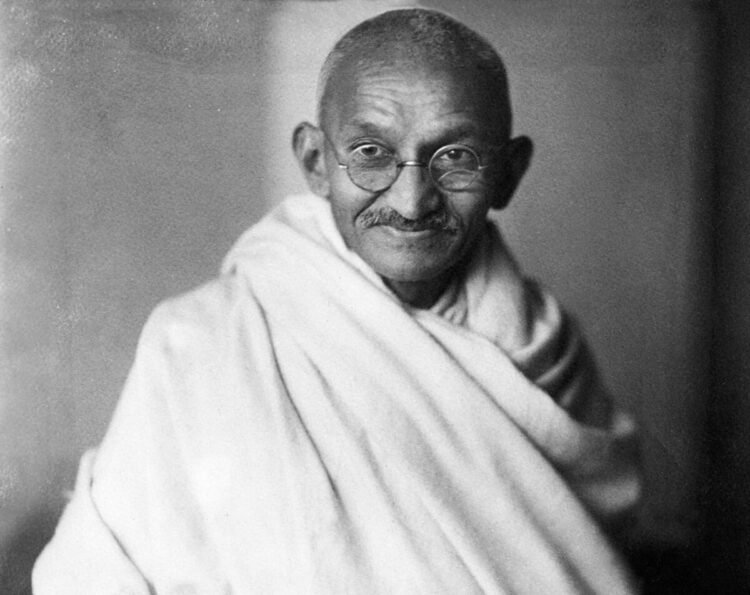Mahatma Gandhi: The Leader of Nonviolence
Mahatma Gandhi was a leader of India’s independence movement and a champion of nonviolence. He is widely regarded as one of the most influential figures in history, who inspired millions of people around the world with his courage, wisdom, and compassion.
Early Life and Background
Mahatma Gandhi was born on October 2, 1869, in Porbandar, a coastal town in Gujarat, India. His full name was Mohandas Karamchand Gandhi. His father, Karamchand, was the chief minister of Porbandar, and his mother, Putlibai, was a devout Hindu. Gandhi grew up in a privileged and cultured family, but he also faced some hardships, such as the death of his father when he was 16 years old.
Gandhi was married at the age of 13 to Kasturba Makhanji, a girl of the same age, as per the custom of arranged marriage. He had four sons with her: Harilal, Manilal, Ramdas, and Devdas. Gandhi was a good student and a voracious reader. He was influenced by the Hindu scriptures, especially the Bhagavad Gita, as well as the works of Leo Tolstoy, Henry David Thoreau, and John Ruskin.
Three Years in London
In 1888, Gandhi left India to study law in London. He wanted to become a barrister and serve his country. He faced many challenges and temptations in the British capital, such as the cold weather, the unfamiliar food, and the social pressure to conform to the Western lifestyle. He also encountered racism and discrimination from some of his fellow students and teachers.
Gandhi decided to adopt a simple and austere way of living. He became a vegetarian and joined the London Vegetarian Society, where he met some of his lifelong friends and mentors. He also developed an interest in religion and philosophy, and explored various faiths such as Christianity, Islam, Buddhism, and Jainism. He read the Bible, the Quran, and other sacred texts. He also learned about the concept of ahimsa (nonviolence) from the Jain teacher Raychandbhai Mehta.
Gandhi completed his law degree in 1891 and returned to India. He hoped to start a successful career as a lawyer, but he soon realized that he lacked the confidence and skills to practice law in India. He struggled to find clients and cases. He also felt alienated from his own culture and society after spending three years in London.
Civil Rights Activist in South Africa
In 1893, Gandhi accepted an offer from an Indian firm to work as a legal adviser in South Africa. He thought that this would be a temporary assignment for one year, but he ended up staying there for 21 years. He witnessed firsthand the oppression and injustice that the Indians faced under the British colonial rule in South Africa. They were denied basic rights such as voting, owning property, traveling freely, and practicing their religion. They were also subjected to racial segregation, humiliation, and violence.
Gandhi decided to fight for the civil rights of the Indians in South Africa. He organized peaceful protests, petitions, boycotts, strikes, and civil disobedience campaigns against the discriminatory laws and policies of the British government. He also founded the Natal Indian Congress (NIC) in 1894 and the Indian Opinion newspaper in 1903 to mobilize and educate the Indian community.
Gandhi developed his own philosophy and method of nonviolent resistance, which he called satyagraha (truth force). He believed that truth and love were more powerful than violence and hatred. He urged his followers to resist injustice with courage and dignity, without harming or hating their oppressors. He also practiced self-discipline, self-reliance, and self-sacrifice in his personal life. He wore simple clothes made from khadi (hand-spun cotton), followed a vegetarian diet, observed celibacy after having four children with his wife, and lived in communal farms such as Phoenix Settlement (1904) and Tolstoy Farm (1910).
Gandhi faced many hardships and dangers during his struggle for civil rights in South Africa. He was arrested several times, beaten by mobs, attacked by assassins, and imprisoned for months. He also suffered from illnesses such as pleurisy (inflammation of lungs), appendicitis (inflammation of appendix), malaria (a disease caused by mosquitoes), dysentery (a disease caused by bacteria), etc. However, he never gave up his faith in nonviolence and humanity.
Gandhi achieved many victories for the Indians in South Africa. He negotiated with the British authorities to grant some concessions and reforms for the Indian community. He also earned the respect and admiration of many people, both in South Africa and in India. He was called Mahatma (great soul) by the poet Rabindranath Tagore, and Bapu (father) by his followers. He returned to India in 1914, as a national hero and a leader of the Indian independence movement.
Struggle for Indian Independence
Gandhi joined the Indian National Congress (INC) in 1915, and became its most prominent and influential member. He launched several mass movements and campaigns to challenge the British rule in India and to demand self-government for the Indian people. Some of his most famous movements and campaigns were:
- Champaran Satyagraha (1917): Gandhi led a protest by the farmers of Champaran, Bihar, who were forced to grow indigo (a blue dye) by the British planters. He exposed the exploitation and oppression of the farmers, and persuaded the British government to abolish the indigo tax and improve the conditions of the farmers.
- Kheda Satyagraha (1918): Gandhi supported the peasants of Kheda, Gujarat, who refused to pay land revenue to the British authorities due to crop failure and famine. He organized a nonviolent resistance campaign, and forced the British government to suspend the revenue collection and provide relief to the peasants.
- Khilafat Movement (1919-1924): Gandhi joined forces with the Muslim leaders to protest against the British decision to abolish the Caliphate (the spiritual and political authority of the Muslims) after World War I. He hoped to create Hindu-Muslim unity and cooperation in the freedom struggle. He also launched a nationwide campaign of non-cooperation with the British government, which included boycotting British goods, institutions, courts, titles, honors, etc.
- Salt March (1930): Gandhi led a historic march from Sabarmati Ashram to Dandi, a coastal village in Gujarat, to defy the British monopoly on salt production and sale. He and his followers made salt from seawater, and encouraged millions of Indians to do the same. He also initiated a civil disobedience movement against the British laws and taxes. He was arrested along with thousands of his supporters.
- Quit India Movement (1942): Gandhi launched his final and most radical campaign against the British rule during World War II. He called for an immediate and unconditional withdrawal of the British from India. He gave the slogan “Do or Die” to his followers, and urged them to resist the British by any means necessary. He was detained at Aga Khan Palace in Pune, where his wife Kasturba died in 1944.
Gandhi’s movements and campaigns had a huge impact on the Indian independence movement. They mobilized millions of Indians from all walks of life, regions, religions, castes, genders, etc., to participate in the freedom struggle. They also challenged the moral legitimacy and authority of the British empire in India. They attracted international attention and support for India’s cause. They also inspired other leaders and movements around the world who fought for justice, peace, and human rights.
Partition and Independence
Gandhi’s dream of a free and united India was shattered by the partition of India into two separate nations: India and Pakistan, based on religious lines. The partition was proposed by Muhammad Ali Jinnah, the leader of the Muslim League, who demanded a separate homeland for the Muslims of India. The partition was accepted by Lord Mountbatten, the last British viceroy of India, who wanted to expedite the transfer of power to avoid further violence and chaos.
Gandhi was opposed to the partition of India. He believed that it would create more hatred and bloodshed between Hindus and Muslims. He tried to persuade Jinnah and Mountbatten to reconsider their decision, but he failed. He also tried to prevent or stop the communal riots that erupted across India before and after the partition. He visited many places where violence had taken place, such as Noakhali (Bengal), Bihar, Delhi, etc., and appealed for peace and harmony among all communities.
India gained its independence from Britain on August 15, 1947. Gandhi did not celebrate this day as a day of joy or victory, but as a day of sorrow and mourning. He spent this day in Calcutta (now Kolkata), fasting and praying for peace among Hindus and Muslims.
Death
Gandhi’s life was cut short by an assassin’s bullet on January 30, 1948. He was shot three times at point-blank range by Nathuram Godse, a Hindu extremist who blamed Gandhi for appeasing Muslims and weakening India. Gandhi was on his way to attend a prayer meeting at Birla House in New Delhi when he was killed.
Gandhi’s death shocked and saddened the entire nation and the world. He was cremated according to Hindu rites at Raj Ghat, on the banks of the Yamuna river, in New Delhi. His ashes were scattered in various rivers and seas across India and abroad. His last words were “Hey Ram” (Oh God).
Legacy and Influence
Gandhi is widely regarded as the father of the nation in India. He is also known as Mahatma (great soul), Bapu (father), and Gandhiji (a respectful suffix). His birthday, October 2, is celebrated as Gandhi Jayanti (Gandhi’s birthday) in India, and as the International Day of Nonviolence by the United Nations.
Gandhi’s philosophy and practice of nonviolence have inspired and influenced many leaders and movements around the world, such as Martin Luther King Jr., Nelson Mandela, Dalai Lama, Aung San Suu Kyi, Cesar Chavez, etc. He is also admired for his teachings on truth, love, compassion, tolerance, justice, equality, freedom, democracy, etc.
Gandhi’s life and work have been documented in many books, films, documentaries, songs, paintings, statues, etc. Some of the most famous ones are:
- The Story of My Experiments with Truth: Gandhi’s autobiography, which covers his life from his childhood to 1921.
- Gandhi: A biographical film directed by Richard Attenborough, which won eight Academy Awards in 1982.
- Gandhi: The Years That Changed the World: A book by Ramachandra Guha, which covers Gandhi’s life from 1914 to 1948.
- Gandhi: A graphic novel by Jason Quinn and Sachin Nagar, which illustrates Gandhi’s life and achievements in a comic book format.
- Vaishnav Jan To: A devotional song based on a poem by Narsinh Mehta, which was Gandhi’s favorite hymn.
He also advocated for peace and harmony among all religions and communities. He was a man of principle and action, who lived by his ideals and values. He was a source of inspiration and hope for millions of people around the world. He was a great soul who left a lasting legacy for humanity.
Copyright@ India CSR
Also Read:





















